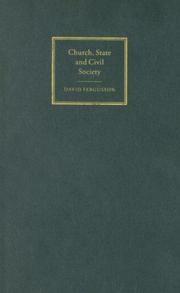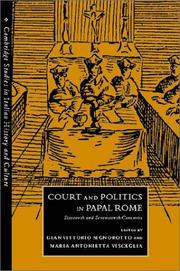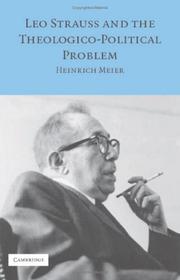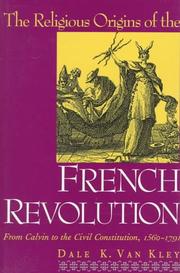| Listing 1 - 10 of 28 | << page >> |
Sort by
|
Book
ISSN: 1631946X ISBN: 9791032000946 9791036577307 Year: 2017 Volume: *90 Publisher: Aix-en-Provence : Presses universitaires de Provence,
Abstract | Keywords | Export | Availability | Bookmark
 Loading...
Loading...Choose an application
- Reference Manager
- EndNote
- RefWorks (Direct export to RefWorks)
Ordre militaire-religieux issu des Croisades, chassé du Levant en 1522, les Hospitaliers de Saint-Jean de Jérusalem, mieux connus sous le nom de chevaliers de Malte, établissent en 1530 leur couvent en Méditerranée occidentale, devenant des acteurs essentiels de l’histoire de l’Europe dans la première modernité. Cet ordre, constitué par la fine fleur de la noblesse européenne, compte aux XVIe-XVIIe siècles un nombre très élevé de nobles français et particulièrement provençaux ; ces derniers représentent le quart des grands-maîtres élus en un siècle et demi. Les chevaliers se spécialisent dans la définition nobiliaire, par l’établissement d’un système d’admissions fondé sur la constitution d’écritures et de généalogies et sur la fourniture de preuves de la pureté du sang et de la race. Cet ordre, symbole d’une perpétuation de la guerre sainte en Méditerranée, est aussi confronté à la diffusion du protestantisme au sein des noblesses européennes, qui l’oblige à conforter son identité religieuse par l’application stricte dans le couvent de la Réforme catholique, œuvrant à une grande discipline des corps et des mœurs des chevaliers. Dans un couvent dirigé à Malte par des grands-maîtres qui mettent en place une véritable vie de cour, les chevaliers sont également sensibilisés aux théories et aux évolutions politiques qui s’observent en Europe : des conjurations nobiliaires éclatent, qui tentent en vain de résister aux ambitions princières des grands-maîtres.
Military religious orders --- Nobility --- Knights and knighthood --- Christianity and politics --- Ordres militaires religieux --- Chevalerie --- Christianisme et politique --- Noblesse --- History --- Histoire --- Knights of Malta --- Chevaliers de Malte --- Ordre souverain, militaire et hospitalier de Saint-Jean-de-Jérusalem, de Rhodes et de Malte --- Ordre souverain, militaire et hospitalier de Saint-Jean-de-Jérusalem, de Rhodes et de Malte. --- Military religious orders - Europe - History --- Nobility - Europe - History --- Knights and knighthood - Europe - History --- Christianity and politics - Europe - History --- Ordres militaires religieux - Europe - Histoire --- Chevalerie - Europe - Histoire --- Christianisme et politique - Europe - Histoire --- Noblesse - Europe - Histoire --- noblesse --- hospitalier --- méditerranée --- couvent --- chevalier de malte --- identité religieuse
Book
ISBN: 9781107044265 110704426X 9781107360082 9781107621299 9781461953456 1461953456 1107360080 1107703301 1139893726 1107621291 1107704057 110759880X 1107694124 1107671086 1306212294 9781107703308 9781139893725 9781107704053 9781107694125 9781107671089 Year: 2013 Publisher: New York
Abstract | Keywords | Export | Availability | Bookmark
 Loading...
Loading...Choose an application
- Reference Manager
- EndNote
- RefWorks (Direct export to RefWorks)
Why, when so driven by the impetus for autonomy, did the city elites of thirteenth-century Italy turn to men bound to religious orders whose purpose and reach stretched far beyond the boundaries of their often disputed territories ? Churchmen and Urban Government in Late Medieval Italy, c.1200-c.1450 brings together a team of international contributors to provide the first comparative response to this pivotal question. Presenting a series of urban cases and contexts, the book explores the secular-religious boundaries of the period and evaluates the role of the clergy in the administration and government of Italy's city-states. With an extensive introduction and epilogue, it exposes for consideration the beginnings of the phenomenon, the varying responses of churchmen, the reasons why practices changed and how politics and religious identity relate to each other. This important new study has significant implications for our understanding of power, negotiation, bureaucracy and religious identity.
Christianity and politics --- Christianisme et politique --- History --- Histoire --- Italy --- Italie --- Church history --- Politics and government --- Histoire religieuse --- Politique et gouvernement --- Christianity and politics. --- Political science. --- Klerus. --- Kommunalpolitik. --- History. --- 476-1559. --- Italy. --- Italien. --- Religion et État --- Communes --- Responsabilité --- Christianity --- Church and politics --- Politics and Christianity --- Politics and the church --- Political science --- Political aspects --- Arts and Humanities --- Religion et État --- Responsabilité
Book
ISBN: 9780521194105 9780511921650 9781107613027 9780511933080 0511933088 9780511927881 0511927886 0511921659 0521194105 1107214327 0511852916 128294374X 9786612943744 0511931735 0511930399 0511925344 1107613027 Year: 2011 Publisher: Cambridge New York Cambridge University Press
Abstract | Keywords | Export | Availability | Bookmark
 Loading...
Loading...Choose an application
- Reference Manager
- EndNote
- RefWorks (Direct export to RefWorks)
In God's Empire, Hilary M. Carey charts Britain's nineteenth-century transformation from Protestant nation to free Christian empire through the history of the colonial missionary movement. This wide-ranging reassessment of the religious character of the second British empire provides a clear account of the promotional strategies of the major churches and church parties which worked to plant settler Christianity in British domains. Based on extensive use of original archival and rare published sources, the author explores major debates such as the relationship between religion and colonization, church-state relations, Irish Catholics in the empire, the impact of the Scottish Disruption on colonial Presbyterianism, competition between Evangelicals and other Anglicans in the colonies, and between British and American strands of Methodism in British North America.
Missions, British --- Christianity and politics --- Missions britanniques --- Christianisme et politique --- History --- Histoire --- Great Britain --- Grande-Bretagne --- Colonies --- Religion. --- Church history --- Religion --- Histoire religieuse --- Imperialism. --- Colonialism --- Empires --- Expansion (United States politics) --- Neocolonialism --- Political science --- Anti-imperialist movements --- Caesarism --- Chauvinism and jingoism --- Militarism --- Missions. --- Christian missions --- Christianity --- Missions, Foreign --- Theology, Practical --- Proselytizing --- Missions --- Arts and Humanities
Book
ISBN: 9783487152431 3487152436 3487421275 Year: 2015 Publisher: Hildesheim, [Germany] ; Zürich, [Switzerland] ; New York : Georg Olms Verlag,
Abstract | Keywords | Export | Availability | Bookmark
 Loading...
Loading...Choose an application
- Reference Manager
- EndNote
- RefWorks (Direct export to RefWorks)
The papers presented in this volume analyse the many ways in which the Vatican, national Churches and individual catholics dealt with the rise of the extreme right in Europe throughout the 1920s, 1930s and early 1940s, from the end of the First World War, arguably one of the main catalysts of European interwar fascism, to the conclusion and immediate aftermath of the Second World War. While a number of papers focus primarily on theoretical, methodological issues pertaining to the book's general theme, the majority of papers focus on either a country or region where a fascist movement or regime flourished between the wars and during the Second World War, and where there was a significant catholic presence in society. The various chapters cover almost the entire European continent - an endeavour that is unprecedented -, and they explore a wide range of relevant contexts and methodologies, thus further contributing to the general development of an interpretive 'cluster' model that incorporates a series of investigative matrixes, and that will hopefully inspire future research.
Fascism and the Catholic Church --- Fascisme --- Aspect religieux --- Eglise catholique --- Catholic Church --- History --- Europe --- Church history --- Histoire religieuse --- 27 "192/193" --- Kerkgeschiedenis--?"192/193" --- Église catholique --- Christianisme et politique --- Christianity and politics --- Fascism --- Activité politique --- Histoire --- Political activity --- Église catholique

ISBN: 0521822394 052152959X 9780511265907 0511265905 0511265182 9780511265181 0511263635 9780511263637 0511264445 9780511264443 1280749938 9781280749933 9780511607097 0511607091 9780521822398 9780521529594 1107159725 0511317565 Year: 2004 Publisher: Cambridge, U.K. New York Cambridge University Press
Abstract | Keywords | Export | Availability | Bookmark
 Loading...
Loading...Choose an application
- Reference Manager
- EndNote
- RefWorks (Direct export to RefWorks)
At a time when secular liberalism is in crisis and when the civic contribution of religion is being re-assessed, the rich tradition of Christian political theology demands renewed attention. This book, based on the 2001 Bampton Lectures, explores the relationship of the church both to the state and civil institutions. Arguing that theological approaches to the state were often situated within the context of Christendom and are therefore outmoded, the author claims that a more differentiated approach can be developed by attention to the concept of civil society. The book offers a critical assessment of the effect of the First Amendment in the USA and, in a concluding chapter, it defends the case for continuing disestablishment in England and Scotland.
Christianity and politics. --- Church and state. --- Christianisme et politique --- Eglise et Etat --- Christianity and politics --- Church and state --- Christianity and state --- Separation of church and state --- State and church --- State, The --- Christianity --- Church and politics --- Politics and Christianity --- Politics and the church --- Political science --- Political aspects --- Arts and Humanities --- Religion
Book
ISBN: 9780521130424 0521130425 9780521113335 0521113334 9780511760365 0511760361 9780511789441 0511789440 9780511784262 0511784260 0511848536 1107202868 1282725017 9786612725012 0511788711 0511786840 0511785704 0511787987 Year: 2010 Publisher: Cambridge New York Cambridge University Press
Abstract | Keywords | Export | Availability | Bookmark
 Loading...
Loading...Choose an application
- Reference Manager
- EndNote
- RefWorks (Direct export to RefWorks)
No account of contemporary politics can ignore religion. The liberal democratic tradition in political thought has long treated religion with some suspicion, regarding it as a source of division and instability. Faith in Politics shows how such arguments are unpersuasive and dependent on questionable empirical claims: rather than being a serious threat to democracies' legitimacy, stability and freedom, religion can be democratically constructive. Using historical cases of important religious political movements to add empirical weight, Bryan McGraw suggests that religion will remain a significant political force for the foreseeable future and that pluralist democracies would do well to welcome rather than marginalize it.
Christianity and politics. --- Liberalism. --- Christianisme et politique --- Libéralisme --- 261.7 --- Liberal egalitarianism --- Liberty --- Political science --- Social sciences --- Christianity --- Church and politics --- Politics and Christianity --- Politics and the church --- De Kerk en de burgerlijke macht: Kerk en Staat; godsdienstvrijheid; verdraagzaamheid; tolerantie --- Political aspects --- Libéralisme --- Christianity and politics --- Liberalism --- Social Sciences --- Political Science

ISBN: 0521641462 0521283140 1107116228 0511117310 0511040326 0511156952 0511329466 0511496923 1280153652 0511051603 9780511040320 9780521641463 9780511051609 0511036361 9780511036361 9780511117312 9780511496929 9780511329463 9780521283144 Year: 2002 Volume: *22 Publisher: Cambridge Cambridge University Press
Abstract | Keywords | Export | Availability | Bookmark
 Loading...
Loading...Choose an application
- Reference Manager
- EndNote
- RefWorks (Direct export to RefWorks)
This 2002 book attempts to overcome the traditional historiographical approach to the role of the early modern papacy by focusing on the actual mechanisms of power in the papal court. The period covered extends from the Renaissance to the aftermath of the peace of Westphalia in 1648 - after which the papacy was reduced to a mainly spiritual role. Based on research in Italian and other European archives, the book concentrates on the factions at the Roman court and in the college of cardinals. The sacred college came under great international pressure during the election of a new pope, and consequently such figures as foreign ambassadors and foreign cardinals are examined, as well as political liaisons and social contacts at court. Finally, the book includes an analysis of the ambiguous nature of Roman ceremonial, which was both religious and secular: a reflection of the power struggle both in Rome and in Europe.
Papal courts --- Christianity and politics --- History. --- Catholic Church --- History --- Collegium Cardinalium --- History of Italy --- Christian church history --- anno 1600-1699 --- anno 1500-1599 --- Vatican City --- Papacy --- Cour pontificale --- Papauté --- Christianisme et politique --- Histoire --- Catholic Church. --- Arts and Humanities --- Christianity --- Church and politics --- Politics and Christianity --- Politics and the church --- Political science --- Courts, Papal --- Popes --- Political aspects --- Court --- Papal courts - History. --- Christianity and politics - Catholic Church - History.

ISBN: 0521856477 9780521856478 9780521699457 9781139177948 0521699452 9780511161810 0511161816 113917794X 1107155711 9781107155718 1139234935 9781139234931 1283378175 9781283378178 9786613378170 6613378178 1139189204 9781139189200 0511161085 9780511161087 1139183281 9781139183284 0511160518 9780511160516 Year: 2007 Publisher: Cambridge : Cambridge University Press,
Abstract | Keywords | Export | Availability | Bookmark
 Loading...
Loading...Choose an application
- Reference Manager
- EndNote
- RefWorks (Direct export to RefWorks)
This book, by one of the most prominent interpreters of Leo Strauss's thought, was the first to address the problem that Leo Strauss himself said was the theme of his studies: the theologico-political problem or the confrontation with the theological and the political alternative to philosophy as a way of life. In his theologico-political treatise, which comprises four parts and an appendix, Heinrich Meier clarifies the distinction between political theology and political philosophy and reappraises the unifying center of Strauss's philosophical enterprise. The book is the culmination of Meier's work on the theologico-political problem. It will interest anyone who seeks to understand both the problem caused by revelation for philosophy and the challenge posed by political-religious radicalism. The appendix makes available for the first time two lectures by Strauss that are immediately relevant to the subject of this book and that will open the way for future research and debate on the legacy of Strauss.
Christianity and politics --- Political science --- Religion and politics --- Theology --- Christian theology --- Theology, Christian --- Christianity --- Religion --- Politics, Practical --- Politics and religion --- Religions --- Political philosophy --- Church and politics --- Politics and Christianity --- Politics and the church --- Philosophy --- Religious aspects --- Political aspects --- Strauss, Leo. --- Religion and politics. --- Christianity and politics. --- Theology. --- Philosophy. --- Religion et politique --- Christianisme et politique --- Théologie --- Philosophie politique --- Strauss, Leo --- Critique et interprétation. --- Arts and Humanities --- Political science - Philosophy. --- Théologie --- Critique et interprétation.

ISBN: 0585351953 9780585351957 9780300147568 0300147562 0300064780 0300080859 9780300064780 0300064780 Year: 1996 Publisher: New Haven, CT Yale University Press
Abstract | Keywords | Export | Availability | Bookmark
 Loading...
Loading...Choose an application
- Reference Manager
- EndNote
- RefWorks (Direct export to RefWorks)
Although the French Revolution is associated with efforts to dechristianize the French state and citizens, it actually had long-term religious-even Christian-origins, claims Dale Van Kley in this controversial new book. Looking back at the two and a half centuries that preceded the revolution, Van Kley explores the diverse, often warring religious strands that influenced political events up to the revolution.Van Kley draws on a wealth of primary sources to show that French royal absolutism was first a product and then a casualty of religious conflict. On the one hand, the religious civil wars of the sixteenth century between the Calvinist and Catholic internationals gave rise to Bourbon divine-right absolutism in the seventeenth century. On the other hand, Jansenist-related religious conflicts in the eighteenth century helped to "desacralize" the monarchy and along with it the French Catholic clergy, which was closely identified with Bourbon absolutism. The religious conflicts of the eighteenth century also made a more direct contribution to the revolution, for they left a legacy of protopolitical and ideological parties (such as the Patriot party, a successor to the Jansenist party), whose rhetoric affected the content of revolutionary as well as counterrevolutionary political culture. Even in its dechristianizing phase, says Van Kley, revolutionary political culture was considerably more indebted to varieties of French Catholicism than it realized.
Regions & Countries - Europe --- History & Archaeology --- France --- Christianity and politics --- Secularism --- Church and state --- Ethics --- Irreligion --- Utilitarianism --- Atheism --- Postsecularism --- Secularization (Theology) --- Christianity --- Church and politics --- Politics and Christianity --- Politics and the church --- Political science --- History --- Political aspects --- Religious aspects. --- Church history --- Religious history --- EGLISE ET ETAT --- FRANCE --- CHRISTIANISME ET POLITIQUE --- JANSENISME --- HISTOIRE --- HISTOIRE RELIGIEUSE --- 17E-18E SIECLES --- 1789-1799 (REVOLUTION) --- CAUSES --- 16E-18E SIECLES --- 18E SIECLE

ISBN: 9780511617294 9780521838764 9780521547529 0511231091 9780511231094 0511226985 9780511226984 051123032X 9780511230325 0511617291 0521838762 0521838762 0521547520 1107162203 9781107162204 0511228686 9780511228681 0511316429 9780511316425 0511229526 9780511229527 128070229X Year: 2005 Publisher: Cambridge, U.K. New York Cambridge University Press
Abstract | Keywords | Export | Availability | Bookmark
 Loading...
Loading...Choose an application
- Reference Manager
- EndNote
- RefWorks (Direct export to RefWorks)
Many democratic citizens, including many Christians, think that separation of religion from the state means the exclusion of religious beliefs from the political process. That view is mistaken. Both democracy and Christian faith, this 2004 book shows, call all Christians to make their beliefs effective in politics. But the discussion here differs from others. Most have trouble relating religion to democratic discussion and debate because they assume that religious differences cannot be publicly debated. Against this majority view, this book argues that Christian faith belongs in politics because it shares with democracy a full commitment to rational pursuit of the truth. The book then develops ideals of justice and the common good Christians should advocate within the democratic process and shows the difference they make for contemporary politics in the United States, focusing specifically on issues of abortion, affirmative action, and economic distribution.
Christianity and justice --- Christianity and politics --- Democracy --- Self-government --- Political science --- Equality --- Representative government and representation --- Republics --- Christianity --- Church and politics --- Politics and Christianity --- Politics and the church --- Justice --- Religion and justice --- Religion and law --- Religious aspects&delete& --- Political aspects --- Christianity and politics. --- Christianity and justice. --- Christianity and democracy --- Religious aspects --- Christianity. --- Christianisme et politique --- Démocratie --- Christianisme et justice --- Aspect relgieux --- Christianisme --- Arts and Humanities --- Religion
| Listing 1 - 10 of 28 | << page >> |
Sort by
|

 Search
Search Feedback
Feedback About UniCat
About UniCat  Help
Help News
News